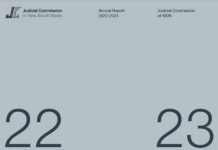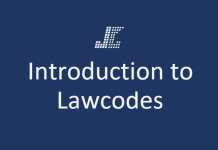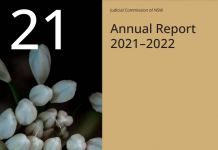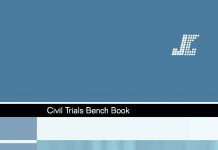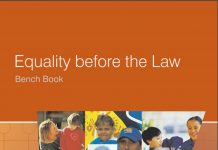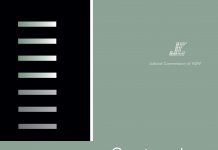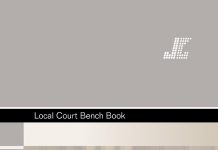The following amendments have been made to the Bench Book for this update:
Child witness/accused
Cross-referencing to parts of [1-349]ff Closed court, suppression and non-publication orders has been updated at [1-150] Other procedural provisions applicable to children.
Cross-examination — improper; of defendant has been re-named [1-340] Cross-examination.
Cross-examination concerning complainant’s prior sexual history
This section has been moved from [1-342] in what was previously Cross-examination — improper; of defendant and is now a separate chapter at [1-347]. References to s 293 Criminal Procedure Act 1986 have been changed to s 294CB as the section was renumbered, with effect from 1 June 2022, by the Crimes Legislation Amendment (Sexual Consent Reforms) Act 2021.
Closed court, suppression and non-publication orders
The following cases have been added where indicated:
- [1-352] Court Suppression and Non-publication Orders Act 2010. Munshizada v R [2021] NSWCCA 307 and Sultani v R [2021] NSWCCA 301 which address whether the power in s 7 Court Suppression and Non-publication Orders Act 2010 extends to a judicial officer in, for example, the District Court, making non-publication orders with the capacity to affect proceedings in another, for example, the Supreme Court.
- [1-359] Self-executing prohibition of publication provisions. Z (a pseudonym) v R [2022] NSWCCA 8 where it was held that the prohibition in s 578A(2) Crimes Act 1900 extends to appeals not involving a prescribed sexual offence if such an offence was part of the original proceedings.
Evidence given by alternative means
This chapter has been revised at [1-362] to update the reference to the DPP (NSW) Prosecution Guidelines which were reissued in March 2021.
Jury
Hoang v The Queen [2022] HCA 14 has been added to:
- [1-495] Offences and irregularities involving jurors. Section 68C(1) Jury Act 1977, which concerns impermissible inquiries by jurors during a trial, is not directed towards inadvertent searches. What is a “matter relevant to the trial” will vary from case to case.
- [1-505] Discharging individual jurors. Once a judge is satisfied of misconduct by a juror (see s 53A(2) Jury Act) the juror must be discharged. In that case, the juror’s internet inquiry about a Working with Children Check was found to amount to misconduct. The fact it was conducted out of curiosity was irrelevant
Self represented accused
[1-840] Cross-examination of complainants in prescribed sexual offence proceedings and vulnerable witnesses in criminal proceedings has been updated. References to s 293 Criminal Procedure Act 1986 have been changed to s 294CB (see above). References to guidelines concerning the professional obligations of Crown Prosecutors, barristers and solicitors when a litigant is self-represented have been updated at [1-835] Notes.Sexual assault communications privilege
In [1-895] Introduction and [1-898] Disclosing and allowing access to protected confidences references to s 293 Criminal Procedure Act 1986 have been changed to s 294CB (see above). WS v R [2022] NSWCCA 77 has been added to the list of cases considering the exclusions in s 294CB Criminal Procedure Act in [1-348] The exclusions in s 294CB(4). In that case, evidence the complainant was raped by another person proximate to the relevant charges and had undergone a pregnancy test around that time was found to satisfy both limbs of s 294CB(4)(c).
Complaint evidence
This has been revised to incorporate amendments to s 294(2) Criminal Procedure Act by the Crimes Legislation Amendment (Sexual Consent Reforms) Act to replace the words “warn” or “warning” with “direct” or “direction”. At [2-570] Suggested direction — where complaint evidence admitted under s 66(2), reference is made to new ss 293A(2A) and 294(2A) Criminal Procedure Act which provide that directions under ss 293A or 294 may be given at any time during the trial and more than once.
Complicity
The suggested direction at [2-720] Suggested direction — accessory after the fact has been amended to clarify that presence alone may be sufficient to make a person liable as an aider and abettor.
Directions — misconceptions about consent in sexual assault trials
This new chapter has been added at [2-980] to provide commentary and suggested directions concerning misconceptions about consent in sexual assault trials following the addition of ss 292 to 292E to the Criminal Procedure Act by the Crimes Legislation Amendment (Sexual Consent Reforms) Act.
Election of accused not to give evidence or offer explanation
[2-1000] Introduction has been amended to add Ahmed v R [2021] NSWCCA 280 where the importance of an Azzopardi direction in cases where the accused bears the onus of establishing a defence was emphasised. A warning cannot necessarily be implied from the right to silence direction.Expert evidence
A new section [2-1110] Specialised knowledge concerning child behaviour: ss 79(2), 108C has been created. This summarises the effect of ss 79(2) and s 108C Evidence Act 1995. A procedural note has been included to suggest an approach that may be taken if expert evidence related to child behaviour in child sexual assault cases is relied upon by the Crown. Aziz (a pseudonym) v R [2022] NSWCCA 76, where consideration was given to the basis on which such evidence is admissible has been added.
Sexual intercourse without consent
A note at the beginning of the chapter indicates that the directions in ss 292–292E Criminal Procedure Act (see [2-980] Directions — misconceptions about consent in sexual assault trials) apply to hearings which commence from 1 June 2022.
The suggested directions at [5-1550] Suggested direction — sexual intercourse without consent (s 61I) for offences committed before 1 January 2008 and [5-1566] Suggested direction — sexual intercourse without consent (s 61I) where alleged offence committed on and after 1 January 2008 and before 1 June 2022 have been extensively revised. The references to legislation in [5-1568] Notes have been updated and the following cases have been added:
- Beattie v R [2020] NSWCCA 334 — which considered the extent of the differences between the earlier provisions concerning consent (former ss 61HA and 61HE Crimes Act).
- Saffin v R [2020] NSWCCA 246 which discusses the three levels of knowledge (actual, reckless and belief on unreasonable grounds).
- Carlyle-Watson v R [2019] NSWCCA 226 where the court concluded that in cases of accessories to sexual intercourse without consent, the relevant state of mind as to the complainant’s lack of consent is knowledge; recklessness is insufficient.
- Decision Restricted [2020] NSWCCA 138 where the court held that the proper medical purpose exception in s 61HA(a) Crimes Act does not apply if a proper medical purpose is accompanied by a sexual purpose.
Suggested directions for certain offences of aggravated sexual assault in s 61J Crimes Act 1900 have been added at [5-1570] Suggested direction — s 61J circumstance(s) of aggravation. JH v R [2021] NSWCCA 324, where the court held the term “serious physical disability” in s 61J(2)(f) did not require explanation for a jury, has been added to the notes at [5-1585].
Keen v R [2020] NSWCCA 59, R v Hajje [2006] NSWCCA 23 and Sita v R [2022] NSWCCA 90, which confirm that a Markuleski direction is not confined to “word against word” cases have been added to the notes at [5-1590] Suggested R v Markuleski (2001) 52 NSWLR 82 direction — multiple counts.
Sexual touching
A note at the beginning of the chapter indicates that the directions in ss 292–292E Criminal Procedure Act (see [2-980] Directions — misconceptions about consent in sexual assault trials) apply to hearings which commence from 1 June 2022.


